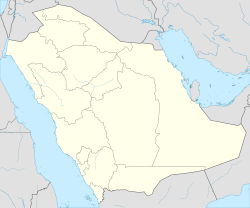Haddat ash Sham | |
|---|---|
Village | |
| Coordinates: 21°47′48″N39°41′0″E / 21.79667°N 39.68333°E | |
| Country | |
| Province | Makkah Province |
| Population | |
• Total | F |
| Time zone | UTC+3 (EAT) |
| • Summer (DST) | UTC+3 (EAT) |
Haddat ash Sham is a village in Makkah Province, in western Saudi Arabia. [1]
